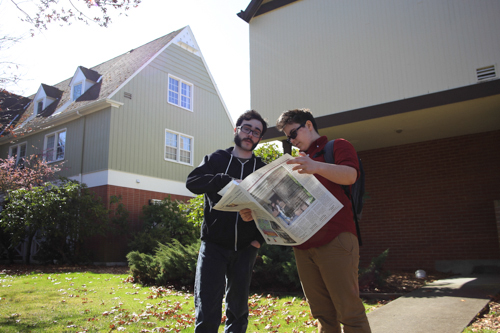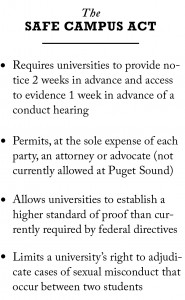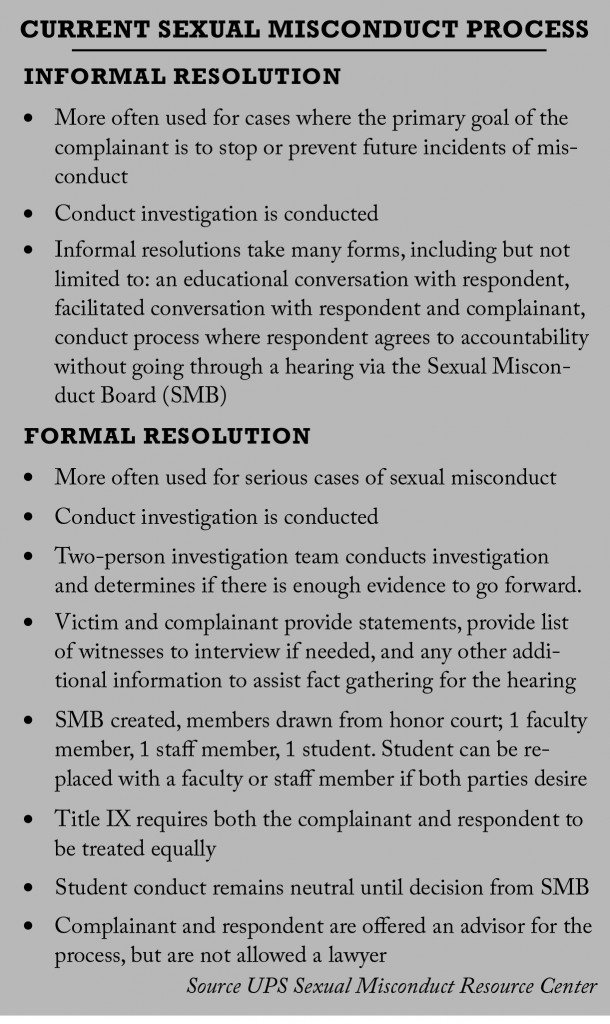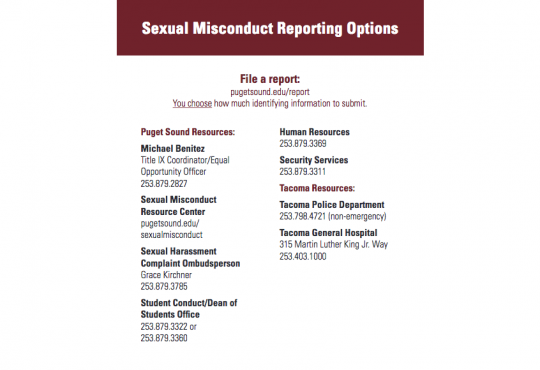
BY CHASE HUTCHINSON
The Safe Campus Act, endorsed by the national conferences representing Greek Life, threatens to weaken college campuses’ ability to investigate and punish instances of sexual assault within their student body.
The Safe Campus Act of 2015, sponsored by U.S. Rep. Matt Salmon (R-Ariz.) and co-sponsored by U.S. Reps. Kay Granger (R-Texas) and Pete Sessions (R-Texas), has recently come under fire from many who feel the legislation could negatively impact, rather than support, survivors of sexual assault on college campuses like the University of Puget Sound.
One such critic is a nonprofit that trains colleges on how to address violence on campus, The Clery Center for Security on Campus. The Clery Center recently voiced criticism of the legislation by joining a coalition of 28 sexual assault survivor advocacy groups opposed to the legislation.
“If implemented, [the Safe Campus Act] will hinder campus reports of sexual assault by mandating a system that removes power from survivors,” the Clery Center said in a statement released following the introduction of the legislation. “This is especially disappointing during a time when as a nation we are making unprecedented progress towards increased awareness of sexual assault on campus.”
Two of the national conferences representing Greek Life, the North-American Interfraternity Conference (NIC) and the National Panhellenic Conference (NPC), have been strong supporters of this act, as they feel it would ensure law enforcement could better address the problem.
Citing public support for the intent of the legislation, the NIC said that colleges should not be able to determine the guilt of alleged perpetrators.
“The Safe Campus Act will more effectively engage the criminal justice system in the investigation and adjudication of allegations of sexual violence while still providing survivors with access to support and resources throughout the criminal and/or campus adjudication process,” the NIC said in a recent press release.
“We believe our support reflects the will of the majority of American voters as well: A recent survey of likely voters determined that 85 percent of likely voters believe the criminal justice system, not colleges, should be primarily responsible for deciding if students are guilty of sexual misconduct or assault.”
“When we became aware of this proposed federal legislation that NIC and NPC have supported, that’s when I started to have conversations with Moe [Stephens, Director of Greek Life & Leadership] and others around the country about how this looks like problematic legislation to me, for a lot of reasons,” Dean of Students Mike Segawa said.
“We did indeed find that [this legislation] is [problematic] for us here on this campus as well as campuses across the country. Moe and I discussed where this leaves us with the NPC specifically and our Greek expansion process,” he said.
“What we decided to do, and really I know that I’m probably the architect behind the conversation, is to delay our expansion process, especially until we can get in conversation with our own students and student leadership here at Puget Sound.”
Director of Greek Life & Leadership Moe Stephens clarified specific parts of the legislation that the campus Greek Life is supporting and to which it is choosing to voice opposition.
They broke down the legislation into three separate parts, explaining what implications each part could have on Greek Life at Puget Sound and the community as a whole.
“The Fraternity and Sorority community agrees with the first two sections pertaining to the right to due process and maintaining the Title IX exemption. The disagreement comes from the sexual misconduct section,” Stephens said.
If the bill were to go into effect, both those reporting an assault and the accused would have the right to hire lawyers during University conduct processes, a right many currently do not have. Section 4 of the University of Puget Sound’s Campus Policy Prohibiting Harassment and Sexual Misconduct does not allow for lawyers to be present at University conduct hearings.
It would also give the accused the right to know the charges they’re facing and see the evidence against them.
The Title IX exemption refers to the exemption that allows Greek Life organizations to maintain their single-sex status.
“The overwhelming majority of leadership in our Fraternity and Sorority community feel like this section of the legislation is a misguided attempt to legislate a complex issue,” Stephens said. This expression of opposition to the legislation differs from their respective national organizations.
“Relying solely on local law enforcement to investigate and adjudicate cases of sexual misconduct on a college campus could create situations where a victim’s rights are severely narrowed.
“In addition, the interim measures allowed under the bill do not adequately take student safety into account,” Stephens said.
Stephens did not dismiss that National Greek Organizations are supporting the legislation, nor that the amount of criticism such organizations are receiving as a result is significant. Rather, they wanted to highlight that Puget Sound Greek students would not be following their national conferences.
“Although the NIC and the NPC both support this legislation, it is important to note that our students have decided to oppose this legislative agenda,” Stephens said. “Emma [Michl, President of the Panhellenic Governing Council] and Anthony [Furr, President of the Interfraternity Governing Council] are working on a statement that will be sent to the NIC and NPC in the near future with our concerns.”
Both Michl and Furr discussed the ongoing, collaborative process taking place regarding the implications of the act and how their separate organizations are responding.
“We have had many formal and informal discussions about the Safe Campus Act as an entire Greek community,” Furr said. “As a result of these discussions, we have decided as a Greek community not to support the Safe Campus Act for many reasons, the foremost being that the proposed way of changing how sexual assault cases are handled by the school would be detrimental to finding justice.”
“The leadership from Sororities and Fraternities community had a day retreat several weeks ago to discuss our positions on the legislation. [We drafted a statement] that conveys the position of the Greek Community and the statement is being vetted by chapter presidents,” Michl said. This statement will be released to the campus community.
Professor of Politics and Government Alissa Kessel was able to share some insight as to why there is support for the bill.
“There is a widespread misapprehension that most rape allegations are false allegations, [a belief which] is based on a false premise,” Kessel said. She also said that a study by David Lisak, entitled “Repeat Rape and Multiple Offending Among Undetected Rapists”, debunked the narrative that support for this bill pushes, a narrative that “most of the time most victims are lying and that they’re making things up.”








